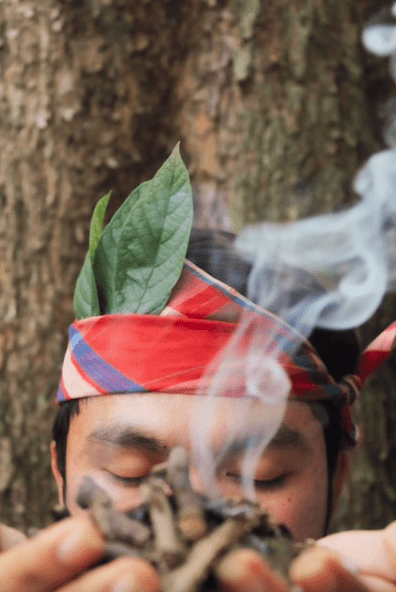Halima Abdulmaguid
North Cotabato, Philippines

In the first week of June, my mother was rushed to the hospital because her cough was getting worse and her shoulder pain no longer bearable. On her x-ray film we saw that half of her lungs were not visible; there was fluid inside causing the obscurity, and there was also a solid mass present.
Soon rumors about a certain person suspected of being jealous of my parents circulated. The concept of “pangalintaw” was brought up. In the Philippines, it is a familiar Maguindanaon word that means the use of sorcery to harm people you loathe. Hence, a “bangamot” was consulted—a kind of person known to cure diseases beyond the logic of science.
A bangamot visited the hospital. After sprinkling liquid on my mother’s body, almost bathing her, the bangamot spread pieces of crushed garlic in the corners of the room while whispering inaudible statements. When my mother was discharged, the bangamot gave her three consecutive baths and a charm.
Being young, my judgement held no importance. I was forced to comply with my elders. I was told that they wanted to do everything and that it would cost us nothing if we believed. Nonetheless, my mother was still suffering. She would cry endlessly from excruciating pain. Unable to endure watching her agony, we drove to the nearest city to meet an oncologist, but our route was diverted. Another bangamot was introduced. Phrases were thrown and rituals were done. A week later, she had a thoracotomy. Tragically, the tumor could not be fully removed because some parts were attached to her aorta. She was diagnosed with lymphoma and was advised to have chemotherapy.
After the operation, my siblings had to work, so I had to take care of our parents. Again, we were recommended to two bangamots. One was an ustadz (a scholar in Islamic religion) who was supplying her sanctified water to drink. The second was like a nightmare, rambling about shirk, jinx, and witchcraft. As a result, I arrived at a decision.
“Please, let’s see someone in white coat.” I begged. My mother heard me, but my father’s ears were elsewhere. We even reached a point where he was preventing me from giving her medicines. He was blinded by the notion of pangalintaw. Despite the efforts, no matter what I did, I could not correct an old man’s belief system.
Whenever my mother was having attacks, he would grab his phone and rely on the things mumbled on the other line. He would come back to us with a glass of water asking her to drink it while smearing some on the parts of her body that were aching. She was carried to the hospital on the last night of her life. It was only during her burial that I heard him say, “She had cancer.”
I have no grudge against my father, for he loved my mother very much, it just so happened that we had different ways of dealing with the circumstances. However, I blame the environment he was exposed to for him being resistant to evidence and tenacious to conservative reasoning. Despite the many advances in science, it is such a pity that there are still people who cannot detach themselves from the practices of the past where religion was the only answer to puzzles, especially when their definition of religion is distracted by tradition.
HALIMA ABDULMAGUID is a fourth year student earning a Bachelor of Arts in English Language at the University of Southern Mindanao. She is a campus journalist at The Mindanao Tech (the official student publication of the University).
Highlighted Vignette Volume 14, Issue 1 – Winter 2022
